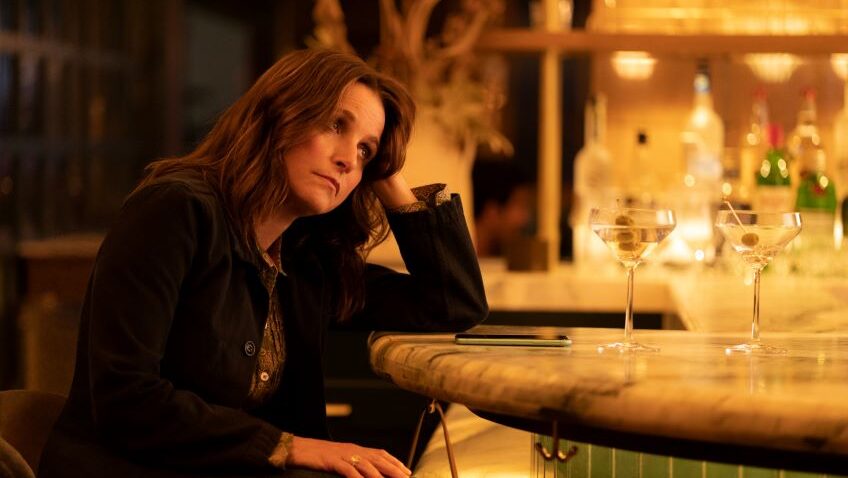Joyce Glasser reviews You Hurt My Feelings (August 8, 2023) Cert 15, 93 mins. On Prime Video
Writer-director Nicole Holofcener is a master at examining thorny issues in midlife relationships and bringing them to the dissecting table like an empathetic doctor who nonetheless finds humour in her vulnerable patients. Until she does, like a patient in the early stages of therapy who does not yet recognise their self-destructive tendencies, we, and her characters, might not even be aware of the problem.
In You Hurt My Feelings Holofcener tackles a universal problem by asking us, “is there a point at which our encouragement or praise for a loved one’s doomed venture becomes unhelpful, dishonest – even a betrayal?” Julia Louis-Dreyfus (Downhill, T.V.’s Seinfeld) shines in a pitch perfect cast, all facing the problem of when honesty in relationships becomes overrated.
Beth (Louis-Dreyfus), a published writer who teaches adult writing classes, and Don, a therapist, are middle-aged New Yorkers, but they act like young lovers demonstratively physical, sharing each other’s food, confiding in one another and never forget their anniversary: exchanging the same gifts that neither want, but that both accept with gushing gratitude.

Beth lacks confidence in the manuscript of her second book after her first book, a memoir, was met with better reviews than sales. Don keeps his increasing doubts about his therapy sessions to himself, but, examining circles under his eyes, he asks Beth’s view on cosmetic surgery after patients comment on how tired he looks.
Their only son Eliot (Owen Tigue), an underachiever who works in a legalised pot shop, feels left out of this close knit relationship, to the point where he is disgusted at his parents intimacy. It doesn’t help that when, distraught after his brainy girlfriend leaves him for someone else, Beth tries to rationalise the situation: ‘Maybe she’s on a different path… becoming a lawyer?’ Eliot retorts, ‘so now I’m a loser, too?’
Holofcener’s portraits of her characters’ working lives are hard to match. It is through their self-appraisal and interaction with clients that she sheds light on their doubts about what they have done with their lives or, in Eliot’s case, what he is going to do with a dispiriting track record. We visit Beth, Don, Eliot, as well as Beth’s sister Sarah (Michaela Watkins) and brother-in-law Mark (Arian Moayed) in their respective workplaces where we get another perspective of who they are as people and what’s eating them.
Two hilarious scenes take place in Eliot’s pot shop. The first is early on when Beth stops by to bring everyone donuts, although she refuses to buy weed from her son, telling the spaced out security guard to “wake up” on her way out. She walks a fine line between being embarrassing and good natured. On another visit, her worst fears come true when the shop is robbed – a perfect bit of slapstick physical comedy.
Sending-up New York therapists and their patients is an American pastime (Holofcener’s mentor, Woody Allen, is perhaps the frontrunner) but the sessions in Don’s office are deliciously entertaining, culminating in one couple, who seem to enjoy viciously bickering for an audience, asking for their money back. They complain, that after ten years and about thirty grand in fees, their relationship hasn’t improved. But when Don, in a rare proactive intervention, broaches the subject of divorce, they are united in outrage at the suggestion.

In her writing class Beth listens hopefully to her students as they present their ideas for writing projects. It is a testimony to Louis-Dreyfus’s talent that her face can express a faint eruption of horror while conveying a supportive, encouraging message. Beth assumes they have chosen her class based on the strength of her memoir and is disconcerted to learn that while no one in her class has read it, they wax lyrical about her closest competitor’s debut novel.
This, and – in a hilarious send up of today’s publishing industry – lunch with her agent (LaTanya Richardson Jackson) who tells her the book is “strong” but not as strong as her memoir, are blows to Beth’s confidence. Fortunately, Beth’s mother, sister and Don are all there to tell her the problem isn’t the manuscript but the agent.
Beth and Don are close to Sarah, an interior decorator, and Sarah’s husband Mark, an actor, who are also experiencing doubts about their chosen profession. Sarah cannot seem to please a fussy nouveau riche client in finding the right light fixture, and Mark does not get the part he was banking on. Beth and Don are as supportive of Sarah and Mark as they are of them.
All this comes to a head by chance when one afternoon, Beth and Sarah are surprised to spot Don and Mark chatting in a shop. Beth, in a mischievous mood, decides to sneak up behind them, and overhears what Don is saying to Mark. That innocent act opens a wound that will not prove fatal but will leave a deep scar.
The chance encounter is not a climax, but a turning point in the story, after which it is the impressively self-aware characters who do the dissecting with a frankness that is as painful as it is healing. There is no violence and there are no bad guys in Holofcener’s films (her Academy Award nominated screenplay for Can You Ever Forgive Me boasts a desperate writer driven to dishonesty and a loveable rogue), but real people with whom you can identify.
In 2013, working with Louis-Dreyfus for the first time, Holofcener made what might be the most beautiful romantic comedy the century to date, Enough Said. Few who saw it can ever forget its poignant, tear-inducing ending as Louis-Dreyfus and the late James Gandolfi play lonely singles, both surprised to be falling in love, who are thrown off course by injured feelings and perceived dishonesty. You Hurt My Feelings is another sharply observed gem that holds a mirror up to the viewer while shedding light on human nature.




